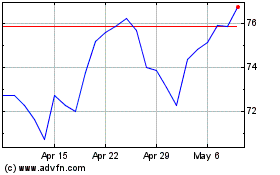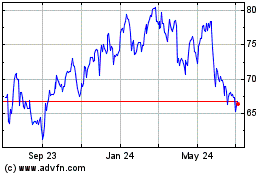By Anna Wilde Mathews and Peter Loftus
This article is being republished as part of our daily
reproduction of WSJ.com articles that also appeared in the U.S.
print edition of The Wall Street Journal (January 17, 2020).
The annual J.P. Morgan health care conference is taking place
this week in San Francisco. Here are some of the hot topics under
discussion at the four-day event, which wraps up Thursday.
Politics Looms Too Large
Investors are overreacting to political developments, Centene
Corp. CEO Michael Neidorff said in a Wednesday interview during the
conference, and added that he is "beyond surprised" at how shares
of managed-care companies have been moving around due to news
related to the presidential campaign.
"There is no rational reason to let a Des Moines Register poll"
affect investment decisions in the sector, he said. Mr. Neidorff
said the U.S. can't afford a single-payer government health-care
system and he doesn't expect one to be enacted.
"Single payers control cost by limiting access," he said. "All
we're talking about with Medicare for All is politics, we're not
talking about good policy."
Congress Could Act on Drug Prices
The pharmaceutical industry's top U.S. lobbyist sees signs that
Congress could agree on legislation to reduce drug costs this year,
potentially in May when certain government health funding expires
and is up for renewal.
Steve Ubl, president of the Pharmaceutical Research and
Manufacturers of America, said there are areas of overlap between
certain drug-price bills in the Democratic-controlled House and a
bipartisan bill that passed the Senate Finance Committee last
year.
"To be honest, we don't love every aspect of every one of these
bills, but if Congress wants to act on drug pricing, the contours
of an agreement are there," Mr. Ubl said during a panel discussion
at the conference on Tuesday. "The real question is whether
politics will supersede the discussion."
The trade group, known as PhRMA, opposes provisions of a House
bill that gives the federal Medicare program power to negotiate
drug prices and cap U.S. prices at a percentage of foreign prices.
But PhRMA supports provisions that cap patients' out-of-pocket
costs for drugs.
J&J Sees Price Pressure
Johnson & Johnson says it is counting on prescription volume
growth rather than price hikes to fuel U.S. sales growth in its
pharmaceutical unit.
While J&J has raised U.S. list prices for some of its drugs,
average net prices -- those J&J realizes after paying rebates
and discounts -- have declined in the past couple of years.
"I don't see pricing getting easier," Jennifer Taubert, head of
J&J's pharmaceuticals unit, said at the conference on
Monday.
Cigna, Oscar Plan a Plan
Cigna Corp. and Oscar Insurance Corp. will launch their joint
small-business insurance plan in a handful of markets by the start
of next year, Oscar CEO Mario Schlosser said in an interview.
The product will first roll out around the third quarter of
2020, he said, and "my hope would be, over time, we can go into all
the markets."
Cigna isn't taking a stake in Oscar, he said, though the two
companies will share risk on the new product, which will use
Cigna's provider network relationships and Oscar's technology.
CVS Expanding Health Hubs
CVS Health Corp. says it has around 50 of its new health hub
stores open, in markets including Philadelphia, and aims for more
than 600 by the end of this year.
The company doesn't disclose the hub stores' profitability, but
says it has seen increased front-store sales, greater customer
engagement and greater pharmacy penetration.
"That is what is giving us the confidence to move with the rapid
rollout, " CEO Larry Merlo said. The company says it will offer
more financial detail once it has a critical mass of stores, this
summer.
Lilly Injects New Thinking
A year ago, Eli Lilly & Co. struck a deal to acquire
cancer-drug developer Loxo Oncology Inc. for $8 billion. Recently
Lilly took the unusual step of putting Loxo executives in charge of
Lilly's oncology research.
More typically, a biotech's leadership departs after being
bought by a larger company. But in Lilly's case, "in a 145-year-old
company, it helps to inject new thinking, new people," Lilly's
R&D chief, Daniel Skovronsky said on the sidelines of the
conference. He said the move will allow Lilly to be more agile in
developing cancer drugs.
BD Doesn't Expect Big Deals
Medical-supplies giant Becton, Dickinson and Co. has no
near-term plans for another major acquisition on the scale of its
purchases of CareFusion Corp. and C.R. Bard Inc. in recent
years.
Instead, once BD pays down debt from the $24 billion Bard deal
to a certain level, "we'll redirect a large amount" of the freed-up
cash flow for smaller, "tuck-in" deals, incoming CEO Tom Polen told
The Wall Street Journal on the sidelines of the conference.
Write to Anna Wilde Mathews at anna.mathews@wsj.com and Peter
Loftus at peter.loftus@wsj.com
(END) Dow Jones Newswires
January 17, 2020 02:47 ET (07:47 GMT)
Copyright (c) 2020 Dow Jones & Company, Inc.
Centene (NYSE:CNC)
Historical Stock Chart
From Oct 2024 to Nov 2024

Centene (NYSE:CNC)
Historical Stock Chart
From Nov 2023 to Nov 2024
